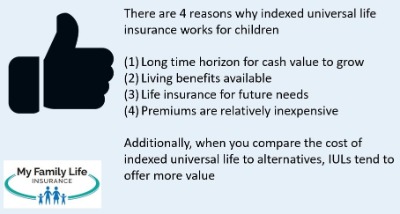All Categories
Featured
Table of Contents
1), usually in an attempt to defeat their classification standards. This is a straw man disagreement, and one IUL individuals like to make. Do they contrast the IUL to something like the Lead Overall Securities Market Fund Admiral Shares with no tons, an expenditure ratio (ER) of 5 basis points, a turnover ratio of 4.3%, and a remarkable tax-efficient record of circulations? No, they contrast it to some terrible actively taken care of fund with an 8% load, a 2% ER, an 80% turn over proportion, and a dreadful document of temporary funding gain distributions.
Common funds often make annual taxed distributions to fund owners, also when the value of their fund has dropped in value. Shared funds not only require earnings coverage (and the resulting annual taxes) when the mutual fund is increasing in worth, however can likewise impose revenue taxes in a year when the fund has gone down in worth.
You can tax-manage the fund, collecting losses and gains in order to minimize taxed distributions to the financiers, but that isn't in some way going to change the reported return of the fund. The possession of shared funds may require the mutual fund owner to pay projected tax obligations (cost of universal life insurance).

IULs are simple to position to ensure that, at the proprietor's fatality, the recipient is not subject to either revenue or inheritance tax. The very same tax obligation decrease techniques do not function almost as well with mutual funds. There are countless, often pricey, tax traps related to the timed trading of mutual fund shares, catches that do not put on indexed life insurance policy.
Opportunities aren't extremely high that you're mosting likely to undergo the AMT due to your shared fund distributions if you aren't without them. The rest of this one is half-truths at best. While it is real that there is no earnings tax obligation due to your heirs when they acquire the earnings of your IUL policy, it is likewise true that there is no earnings tax obligation due to your successors when they acquire a common fund in a taxable account from you.
Signature Indexed Universal Life
The government estate tax exemption restriction mores than $10 Million for a pair, and expanding each year with rising cost of living. It's a non-issue for the substantial majority of medical professionals, much less the remainder of America. There are far better ways to avoid inheritance tax issues than acquiring financial investments with reduced returns. Shared funds may create revenue taxes of Social Security advantages.

The development within the IUL is tax-deferred and might be taken as tax obligation free income by means of loans. The policy owner (vs. the mutual fund supervisor) is in control of his or her reportable income, hence enabling them to reduce and even remove the taxation of their Social Protection benefits. This one is terrific.
Right here's one more very little issue. It holds true if you acquire a mutual fund for claim $10 per share simply before the distribution date, and it distributes a $0.50 circulation, you are after that mosting likely to owe taxes (most likely 7-10 cents per share) in spite of the truth that you have not yet had any gains.
In the end, it's actually regarding the after-tax return, not just how much you pay in tax obligations. You are mosting likely to pay more in taxes by utilizing a taxed account than if you get life insurance policy. You're additionally probably going to have more money after paying those tax obligations. The record-keeping requirements for owning mutual funds are considerably much more intricate.
With an IUL, one's documents are maintained by the insurer, copies of annual declarations are mailed to the owner, and circulations (if any kind of) are totaled and reported at year end. This is likewise type of silly. Naturally you ought to keep your tax documents in situation of an audit.
Indexed Universal Life Pros And Cons
Rarely a factor to purchase life insurance coverage. Common funds are generally part of a decedent's probated estate.
In enhancement, they are subject to the hold-ups and expenses of probate. The earnings of the IUL plan, on the various other hand, is always a non-probate circulation that passes beyond probate straight to one's called recipients, and is for that reason exempt to one's posthumous financial institutions, unwanted public disclosure, or comparable hold-ups and costs.
Medicaid incompetency and life time income. An IUL can supply their owners with a stream of income for their entire life time, regardless of just how long they live.
:max_bytes(150000):strip_icc()/dotdash-comparing-iul-insurance-iras-and-401ks-Final-71f14693e37d4fb1b0736112179802b5.jpg)
This is valuable when arranging one's events, and transforming properties to income before a retirement home confinement. Shared funds can not be transformed in a comparable fashion, and are usually considered countable Medicaid possessions. This is one more stupid one supporting that poor individuals (you understand, the ones who require Medicaid, a government program for the inadequate, to pay for their assisted living facility) should use IUL rather of mutual funds.
Nationwide Universal Life Insurance
And life insurance policy looks awful when contrasted relatively against a retired life account. Second, people who have money to purchase IUL over and past their retirement accounts are going to need to be terrible at managing money in order to ever before get Medicaid to pay for their retirement home costs.
Chronic and incurable disease cyclist. All policies will certainly permit a proprietor's simple accessibility to cash from their plan, commonly waiving any kind of abandonment charges when such people experience a severe disease, require at-home treatment, or come to be constrained to an assisted living facility. Common funds do not provide a comparable waiver when contingent deferred sales charges still put on a common fund account whose owner needs to sell some shares to money the costs of such a stay.
Universal Whole
You obtain to pay more for that benefit (biker) with an insurance policy. Indexed universal life insurance coverage gives death advantages to the beneficiaries of the IUL proprietors, and neither the owner nor the recipient can ever before shed money due to a down market.
I certainly do not need one after I reach financial freedom. Do I desire one? On average, a buyer of life insurance policy pays for the real cost of the life insurance coverage advantage, plus the costs of the plan, plus the revenues of the insurance coverage business.
National Life Iul
I'm not entirely certain why Mr. Morais threw in the entire "you can not shed money" again below as it was covered fairly well in # 1. He just wished to duplicate the very best marketing factor for these things I mean. Once more, you don't lose nominal bucks, but you can shed real bucks, as well as face serious opportunity price due to reduced returns.

An indexed universal life insurance policy proprietor may trade their policy for a completely various plan without triggering income tax obligations. A shared fund owner can stagnate funds from one shared fund company to an additional without selling his shares at the previous (thus causing a taxable event), and repurchasing brand-new shares at the latter, usually based on sales costs at both.
While it holds true that you can exchange one insurance coverage for an additional, the factor that people do this is that the first one is such a terrible policy that even after getting a new one and experiencing the early, unfavorable return years, you'll still appear ahead. If they were offered the right plan the initial time, they should not have any type of wish to ever exchange it and go via the very early, unfavorable return years once again.
Table of Contents
Latest Posts
My Universal Insurance
Minnesota Life Iul
Equity Index Life
More
Latest Posts
My Universal Insurance
Minnesota Life Iul
Equity Index Life